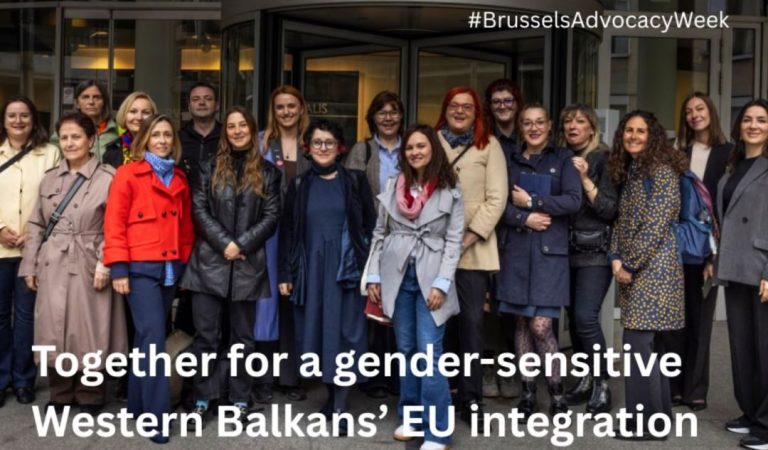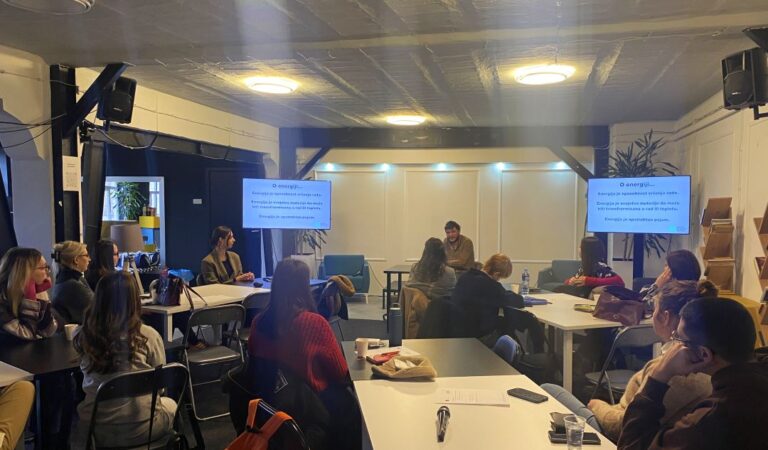Through a series of lectures held in December and January, the second School of Economic and Social Rights brought together activists, students, trade unionists, workers, journalists, lawyers and raised important questions about the indivisibility of human rights.
The focus of the lectures was on the importance of economic and social rights, their unjustified marginalization in public policies, the obligations of the state and its failure to fulfill those obligations, justiciability and protection mechanisms.
During the introductory lectures, the nature and position of economic and social rights in the domestic and international system of human rights protection was discussed, emphasizing the fact that they are no less important than civil and political rights. The subsequent lectures addressed special rights such as the right to adequate housing and the right to social protection. In addition, we talked about the monitoring of economic and social rights and indicators for measuring their realization. Attendees were particularly interested in the lecture on the impact of economic policy measures on poverty, in which we analyzed the budget of the Republic of Serbia and its (lack of) commitment to economic and social needs of citizens. The last set of lectures focused on the access to economic and social rights of particularly vulnerable population groups – Roma, travelers, people with disabilities and women.
One of the key conclusions discussed repeatedly is how important it is for the enjoyment of economic and social rights and justiciability that the Republic of Serbia ratifies the Optional Protocol to the International Covenant on Economic, Social and Cultural Rights. By ratifying the Protocol, it would be possible for citizens to apply to the United Nations Committee on Economic, Social and Cultural Rights and thus obtain protection like that offered by the European Court of Human Rights, in case when domestic courts fail to protect their economic and social rights.
Sara Ristić, a project manager of the Info Park – Refugee Support Center who attended the School, talked about her experience in this program: “As economic and social rights are an inseparable factor affecting the overall well-being of all people, it is crucial to take them into account when working with people from marginalized groups. The School of Economic and Social Rights was very useful for my daily activist work. Although most of us participants lack a formal legal education, the lecturers managed to provide us with basic information about the legal framework, theory and practices related to the economic and social rights and how their realization is connected with the position in society in a clear and concise manner. The school really helped me to get a wider view of problems of the people I work with and to understand how much more struggle we have ahead of us until each of us can enjoy our economic and social rights as the law provides!”
Natalija Havelka from the Center for Peace, Nonviolence and Human Rights (Osijek) commented on the global situation of economic and social rights: “Social injustice and social inequality affect the most marginalized members of our society the most. It is the duty of every state to respect legal obligations related to economic and social human rights and ensure its citizens a dignified life, safety, and protection. In order for this to happen, the proactive action of citizens in order to reduce social inequality and approach social justice is necessary. It was the participation in the School of Economic and Social Rights organized by A 11 Initiative that motivated, encouraged and directed me additionally to act in that direction”.
The lecturers made a valuable contribution to the discussions with their extensive direct experience in the fields they deal with. In addition to the lecturers from A 11 Initiative, we had the opportunity to talk with Francesca Feruglio from the International Network for Economic, Social and Cultural Rights, Angela Kasule, a program director of the Initiative for Social and Economic Rights from Uganda, Aleksandar Vićentijević from the Fiscal Council, Lazar Stefanović, an associate of the Initiative for the Rights of Persons with Disabilities and a doctoral student at the University of Vienna, Kosana Becker, a program director of the Association of Female Citizens FemPlatz, Nikola Kovačević, an expert on migration and right to asylum, and Jelena Kasumović, an associate of REDI and A 11 Initiative.
The interest in attending the School was great this year as well, so over 30 participants completed the program successfully. It is important for us to gather people committed to the improvement of economic and social rights, and in the future we are planning additional networking activities for the alumni community of the School. We invite you to follow future invitations that we will publish in connection with this program and to join us.



